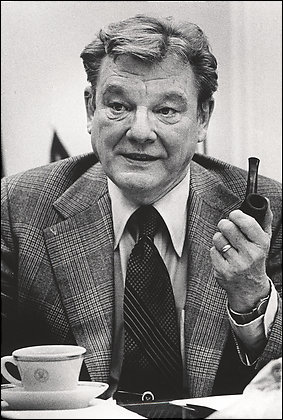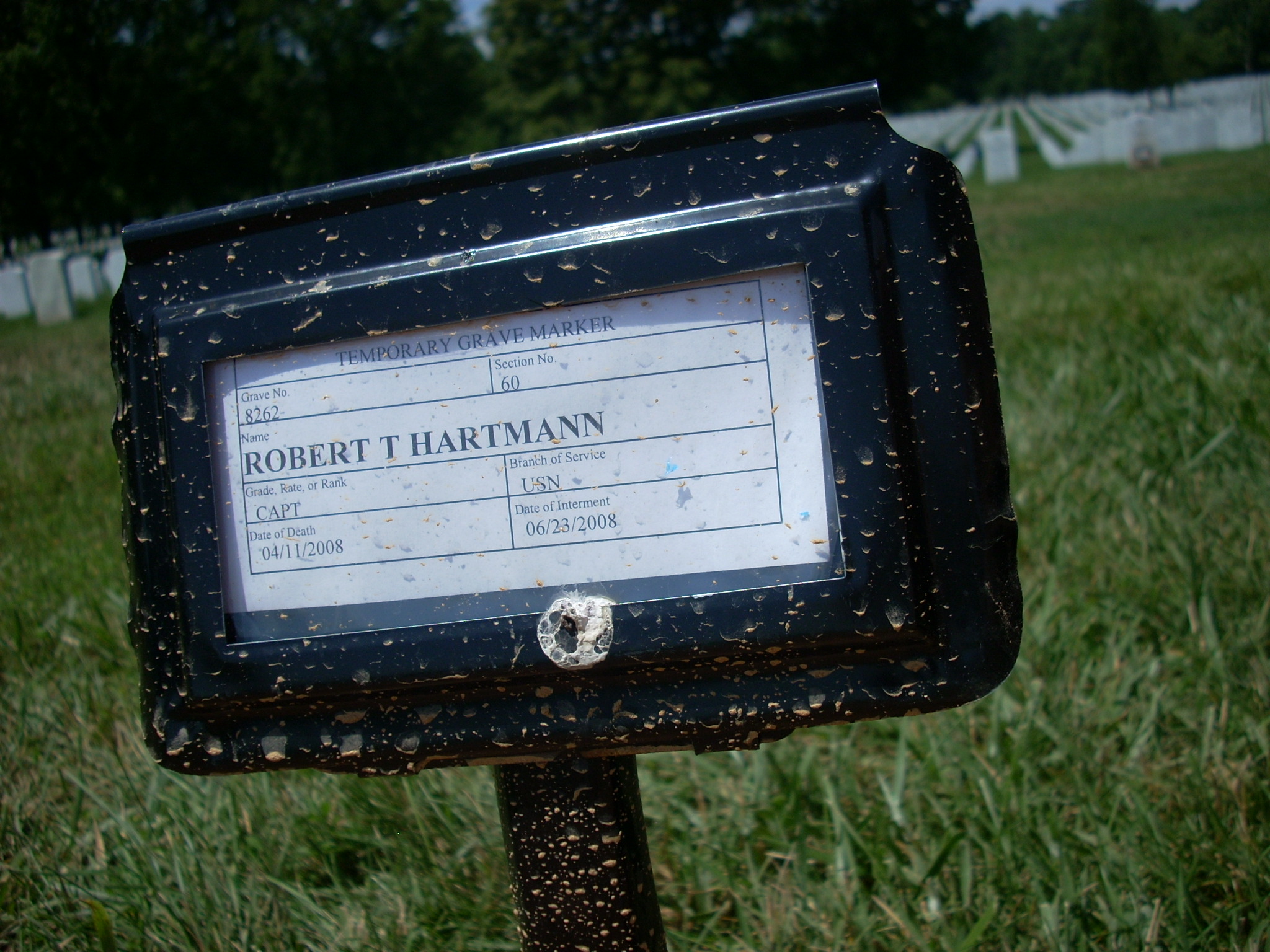Robert Trowbridge Hartmann died on April 11, 2008, of cardiac arrest, in Washington, D.C. He was 91 and lived in Bethesda, Maryland and Christiansted, St. Croix, where he was a member of the St. Croix Reformed Church in the U.S. Virgin Islands. During his life, he combined the perspectives of the White House and the Congress, a prize-winning newsman and foreign correspondent, a wartime Naval officer and information specialist. He will be buried at Arlington National Cemetery on Monday, June 23, 2008, with full military honors. A memorial service will be held in Washington, D.C. on Saturday, May 31.
Born April 8, 1917 in Rapid City, South Dakota, son of the late Dr. and Mrs. Miner Louis Hartmann of Beverly Hills, California, he spent his youth in upstate New York and southern California and was graduated from Stanford University in 1938.
Having served as Vice President Gerald Ford’s chief of staff, Hartmann was President Ford’s first appointment when Ford became President on August 9, 1974. Appointed Counselor to the president with Cabinet rank, he supervised the research, correspondence and writing staff in the White House office and personally drafted and edited most of Ford’s statements and speeches. This included the 1974 address in which Ford, assuming the presidency after the resignation of Richard M. Nixon, told the nation, “our long national nightmare is over.”
As one of the two Cabinet-rank counselors to serve throughout the Ford Administration, he took part in White House policy-making sessions and accompanied the president throughout the 1974 and 1976 political campaigns and on his travels to Europe, the Far East and the Soviet Union. Before leaving office, Ford named him to a three-year term on the Board of Visitors, United States Naval Academy.
In 1980 McGraw Hill published Hartmann’s “Palace Politics: An Insider Account of the Ford Years.” As Ford’s closest personal aide from the Congress to the White House, he wrote a critical and analytical account about this nation’s first unelected president including insider information on the pardon of Richard Nixon.
During World War II, he served in the Pacific on the staffs of Fleet Admiral Chester W. Nimitz and Admiral William F. Halsey, rising from Ensign to Lieutenant Commander, United States Naval Reserve. He retired in 1977 in the grade of Captain, United States Naval Reserve.
After the war, he returned to the staff of the Los Angeles Times as a reporter and in 1948 became its youngest editorial writer. As a winner of an Ogden Reid Foundation Fellowship in 1951, he covered the Middle East, based in Beirut, Lebanon.
In 1954, Hartmann was named chief of the Los Angeles Times’ Washington Bureau, and during the next decade he covered Congress, the White House, the campaigns and global travels of Presidents Eisenhower and Kennedy and Vice President Nixon, including the “Kitchen Debate” in Moscow with Nikita Khrushchev. He won the 1958 national Distinguished Service Award of Sigma Delta Chi, the Society of Professional Journalists, for the year’s best Washington correspondence. He also won the Overseas Press Club of America’s 1961 citation for the best series on Latin America and other journalistic honors. In 1963 and 1964 he established and headed his paper’s Mediterranean and Middle East Bureau based in Rome, Italy. Returning to Washington as North American information chief for the international Food and Agriculture Organization, he joined the professional staff of the Republican Conference of the U.S. House of Representatives a year after Representative Gerald R. Ford (R-Michigan) was elected minority leader.
Married for 65 years to the former Roberta Sankey, he is survived by her, one son, Robert Sankey Hartmann of Bethesda, Maryland; one daughter, Roberta Brake of Louisville, Kentucky; four grandchildren: Stephen Brake, Julie Barkley, Daniel Satterthwaite Hartmann and David Trowbridge Hartmann; and great-grandchildren: Josh Barkley and Kyle Kocks.
In lieu of flowers, donations may be made in honor of Robert T. Hartmann to St. Croix Reformed Church, RR 01 Box 6125, Kingshill, Virgin Islands 00850.
By Adam Bernstein
Courtesy of the Washington Post
Tuesday, April 15, 2008
Robert T. Hartmann, 91, who wrote the memorable speech for President Gerald R. Ford that declared the end of the Watergate crisis with the declaration that “our long national nightmare is over,” died of cardiac arrest April 11, 2008, at Sibley Memorial Hospital.
Mr. Hartmann spent 25 years as a reporter and editor at the Los Angeles Times before his interest in conservative Republican politics led him to enter politics. His best-known role was as confidant and senior aide to Ford, a Michigan congressman who became Vice President and President.
At the Ford White House, Mr. Hartmann held the title of counselor and directed the president’s speechwriting staff. He also was liaison between the executive office and Republican Party organizations.
In his memoir, “A Time to Heal,” Ford wrote that he was reluctant to use Mr. Hartmann’s “national nightmare” line to describe the electorate’s weariness with the Watergate fallout. Because of the crisis, President Richard M. Nixon’s resigned in August 1974 rather than face impeachment over the Watergate coverup.
Ford said Mr. Hartmann pushed him to use the phrase for the August 9, 1974, address, explaining: “It’s been a nightmare for everybody. For you, for me, for Nixon’s friends and Nixon’s enemies. For everybody in this country. It’s something that has to be said, and you’re the only one who can say it.”
Ford wrote that Mr. Hartmann “was absolutely right,” and the speech was arguably the most memorable he gave. After taking the presidential oath, Ford said in his address, “My fellow Americans, out long national nightmare is over. Our constitution works. Our great Republic is a government of laws and not of men.”
The statesmanlike speech was the highlight of Mr. Hartmann’s work during Ford’s short-lived presidency.
Mr. Hartmann was called brusque even by admirers such as Ford and clashed often with other powerful aides, including Dick Cheney, Donald H. Rumsfeld and Alexander Haig. Frequently, Mr. Hartmann felt his influence diminished.
In his 1980 autobiography, “Palace Politics,” Mr. Hartmann elaborated on his disagreements with other White House officials and blamed many of the former Nixon aides for Ford’s election loss in 1976.
Robert Trowbridge Hartmann was born April 8, 1917, in Rapid City, South Dakota, and grew up in Upstate New York and Southern California. He joined the Los Angeles Times in 1939, a year after graduating from Stanford University. He had been editor of the student magazine.
During World War II, he worked in public relations and press censorship roles for the Navy in the Pacific. He retired from the Navy Reserve in 1977 with the rank of Captain.
Resuming his career at the Times, he was Washington bureau chief from 1954 to 1963 and finished his newspaper career the next year after opening the Rome bureau. He won several journalism honors.
When Mr. Hartmann left journalism, he was hired as an “idea man” for the House Republican Conference and befriended Ford, a Republican from Michigan who was then the House minority leader.
After Ford lost the 1976 presidential race, Mr. Hartmann won a two-year appointment as senior research fellow at the Hoover Institution at Stanford.
He was a resident of Bethesda and St. Croix, U.S. Virgin Islands, and his memberships included the International Club of Washington and the Chevaliers du Tastevin, a wine appreciation society.
Survivors include his wife of 65 years, Roberta Sankey Hartmann of Bethesda and St. Croix; two children, Roberta Brake of Louisville, Kentucky, and Robert S. Hartmann of Bethesda; four grandchildren; and two great-grandsons.
NOTE: Captain Hartmann was buried on 23 June 2008 in Section 60, Gravesite 8262, Arlington National Cemetery, with full military honors.
Michael Robert Patterson was born in Arlington and is the son of a former officer of the US Army. So it was no wonder that sooner or later his interests drew him to American history and especially to American military history. Many of his articles can be found on renowned portals like the New York Times, Washingtonpost or Wikipedia.
Reviewed by: Michael Howard


